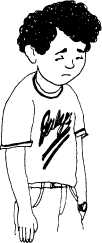
- •I think we should vote «Yes.»
- •I’m sorry
- •Answer yes or no
- •Read the paragraph and fill in the blanks.
- •I’m over here!
- •Circle the correct answer
- •Match the appropriate gesture to what someone says.
- •What do you do …
- •I hang my head.
- •Complete the question
- •Choose the best response for each situation
- •Complete the sentences.
- •Match the things people say to the gestures they make. Do the two sections separately.
- •What do you do?
УДК 395 = 111
ББК Ш 143.21
К 897
Куклина О. Н., Лоскутова Г.В.
К 897 Body Signs: учебное пособие на английском языке – Йошкар-Ола: МарГУ, 2011. – 74 с.
ISBN
Настоящее пособие направлено на освоение материала по разделу практика этикета и культура общения. Оно призвано научить студентов читать, переводить, беседовать по актуальной теме языка жестов. Учебное пособие предназначено для студентов 3-4 курсов, обучающихся по направлениям: 034700.62 «Документоведение и архивоведение», 080200.62 «Менеджмент» («Международный менеджмент»)
УДК 395 = 111
ББК Ш 143.21
ISBN
От авторов
Знание языка жестов важный, но часто не принимающийся во внимание компонент изучения английского языка. Описание многих жестов входит в состав идиоматических выражений, что подтверждает важность их изучения. Предлагаемое учебное пособие включает в себя набор аутентичных текстов и заданий к ним в рамках темы изучения языка жестов. Цель данной разработки – дальнейшее совершенствование речевых умений и навыков студентов, расширение их лингвострановедческих знаний.
По структуре настоящее пособие состоит из десяти уроков, посвященных описанию жестов и наиболее часто встречающихся выражений. Каждый урок концентрируется на особой части тела и состоит из трех частей: Reading, Exercises и Discussion.
Первая часть описывает жесты, связанные с определенной частью тела: the head, the hand, the eyes, the mouth, the shoulders and arms. Она сопровождается рисунками. Послетекстовые упражнения включают задания на развитие навыков говорения, предусматривают отработку использования выражений по теме и умение дискутировать по данной проблеме. Формой контроля заданий являются тесты на восстановление целостности текста, вопросно-ответные упражнения. Лексико-грамматические задания предусматривают выполнение упражнений на объяснение терминов, подбор синонимов, словообразование и словоупотребление.
В пособие включены тесты, которые можно использовать в качестве контролирующего и справочного материала.
Учебное пособие «Body sign» поможет студентам, магистрантам, а также всем, кто интересуется представленной тематикой, расширить свои знания в этой области, овладеть соответствующей лексикой, приобрести навыки работы с текстами разной сложности, преподавателям английского языка – организовать коллективную и индивидуальную работу студентов на уроках и факультативных занятиях.
UNIT 1
THE HAND
RE READING
People use their hands to make many gestures. For example, when people meet, they often shake hands.
It's nice to meet you

People shake hands when they introduce themselves or when they are introduced to someone. Two men almost always shake hands. A man and a woman or two women will also shake hands, especially at a formal or serious occasion, or when they meet on business.
On more informal occasions, people don't always shake hands when they meet. If you are not sure if shaking hands is appropriate, wait to see what the other person does.
There are also other reasons for shaking someone's hand. A handshake is in order when you congratulate someone. Any time someone receives some particularly good news, you can shake his or her hand.
When two people agree on something or decide to do something together, they might shake hands. This could happen at the conclusion of a business transaction or when making a bet. One person will say, "Let's shake on it." Many English speakers think that a handshake is as good as a written agreement.
You can use your hand to show you want to say something at a meeting or in class. To show your teacher that you know the answer to a question, you can raise your hand. If you are not quite sure that your answer is correct, you might raise your hand like this.

If you are completely sure of yourself, you might do this.
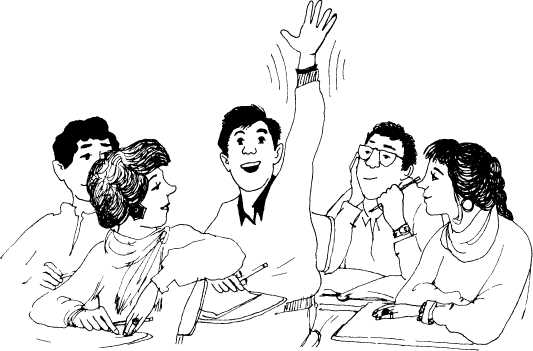
Which student would your teacher call on?
You can also raise your hand to identify yourself. An example of this is when your teacher takes attendance. When you hear your name, you might say "Here" or "Present" and raise your hand.
Raising your hand is also a way of volunteering to do something. If, for example, your teacher needs a student to do some work on the board, you might raise your hand to show that you will do it.
Finally, one of the most common gestures is to wave your hand to say "hello" or "good-by." People in the United States usually raise one arm with the palm out and move the hand from side to side.

EX EXERCISES
A. Choose the best response for each situation
a. I'd raise my hand.
b. I'd shake that person's hand.
c. I'd wave my hand.
d. I'd shake on it.
__a__ You think you know the answer to your teacher's question.
_____ 1.You are in an airport terminal, and you see your friend getting off a plane.
_____ 2. A friend won a lot of money.
_____ 3. You are in the library, and you see a friend across the room.
_____ 4.You and a friend agree to share an apartment.
_____ 5.Your teacher wants a student to pass out some papers. You decide to help.
_____ 6. Your teacher introduces you to another teacher.
_____ 7. You are standing in front of your house, and your family is driving away in the car.
_____ 8. You and a friend decide to go into business together.
_____ 9. You are in class, and you have something to say.
_____ 10. Your teacher asks who didn't do the homework for today. You completely forgot about it.
B. Complete each sentence.
I say, "Congratulations," and I shake hands .
I say, "Nice to meet you," and I
__________________________________ .
I shout, "Hello over there!" and I _________ .
I say,” I’ll do it”. And I
I say, "Agreed," and I ____________________ .
I shout, "Don't forget to write!" and I _________
________________________________________________________
DISCUSSION
Before two people leave each other, they might either shake hands or wave to each other. Describe an appropriate situation for each gesture.
Why do you think the custom of raising hands in classrooms started?
Some groups of people invent secret handshakes. What kinds of groups do this? Why do you think they do this?
After an argument or fight is over, the people involved sometimes shake hands. What does this mean?
There are many kinds of handshakes. They can be short or long, strong or soft. Do you think a handshake can tell you something about a person? Explain.
Shaking on something is a friendly, informal way of making an agreement. A written contract is a formal agreement. Give an example of when people might use each one.
What other ways can the body be used to communicate the things mentioned here?
Is the hand used to communicate the same things in your country as are mentioned in this unit? If not, what gestures do you use?
UNIT 2
THE EYES
RE READING
When English speakers talk with one another, they usually look at each other's eyes for only a few seconds at a time. They look away briefly, then they look back. If you look into an English speaker's eyes for too long a time, you might make that person feel uncomfortable or nervous.
There are times, however, when English speakers do look directly into another person's eyes for a long period of time. One reason is to show anger or to show that you are the boss. (That's why it can make people nervous.)
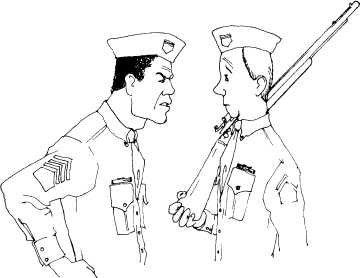
Another reason for looking directly at someone is to show that you are honest. If you want an English speaker to believe you, it is important to look the person in the eye. If you don't, he or she might think that you aren't telling the truth or that you are hiding something. We say that people whose eyes move from side to side are people with shifty eyes. We usually don't trust them.
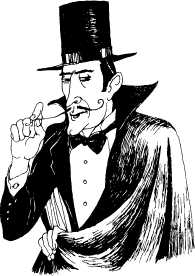
A third reason for continuing to look at someone is to say "I like you." When you give someone the eye, you are trying to attract that person's attention and say that you are interested in him or her. You can do this by slightly lowering your head and looking up or to the side.
Suppose you are in school or at a party and you see someone whom you think is attractive. You might give that person the eye. If the person thinks that you are attractive, too, he or she might make eye contact with you. This means that you look into each other's eyes and smile to show you are interested in meeting.
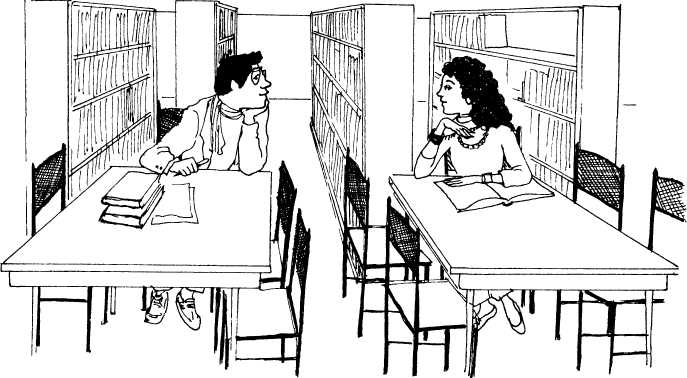
Another way of saying "I like you" to a person you don't know is to wink at the person. You do this by quickly closing and opening one eye. Winking at someone or giving someone the eye isn't done very often. Some people find it insulting, so it can result in a lot of trouble. Of course, it can occasionally have very pleasant results!
A more common reason for winking at someone is to say "I'm joking" or "I'm not serious." Winking is often used to tell someone that a third person is the object of a joke.
We can use the expression wink at to mean "not pay attention to." We might say, for example, "The boss knew her secretary came to work late today, but she winked at it."
Your birthday? I forgot all
about it!
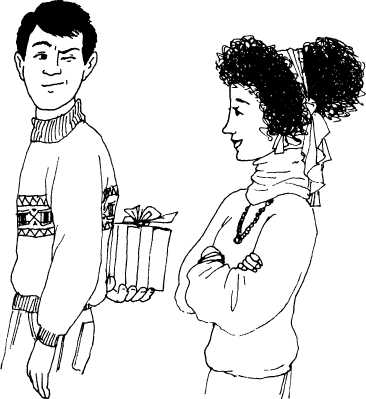

EX EXERCISES
A. Cross out the sentence that doesn't make sense in each paragraph.
The first thing that Ms. Jones
noticed about the job applicant was his shifty eyes. She
knew at once that oho could trust him.
She told him that she had already hired
someone.
Steve looked his father in the eye and said, "Dad, I wouldn't lie to you. I don't know who broke the window." Steve's father believed him. Steve's father punished him for his dishonesty.
Susan doesn't like it when men give her the eye. One day, when she and her sister were sitting in a cafe, a man tried to make eye contact with her. Susan went to his table and thanked him. Soon she and her sister left the café
Allen likes to play jokes on his sister Carla. One day a salesperson telephoned their house. Allen answered the phone, winked at his father, and told Carla that the call was from her boyfriend. Carla talked to her boyfriend for an hour. She was angry with Allen all day.
Ken and Barb met at a dance. They soon discovered that they liked each other very much. When Ken asked Barb if he could see her again, she just winked at him. Ken was very disappointed.
B. Answer the questions.
When Don winked at Linda, she threw her drink in his face. What can you say about Don and Linda?
Don liked Linda, but she didn't like him.
Yesterday in the cafeteria, John was giving Sue the eye. What can you conclude about John?
________________________________
Dick told his mother that he didn’t know who ate all the cookies, but he wouldn't look her in the eye. What do you think happened to the cookies?
__________________________________
Bill winked at Mary. Then he said something to Ruth. After that, both Bill
and Mary laughed. Why did Bill wink at Mary?
________________________________
Mark and Carol make eye contact at a party. Carol smiles and starts to walk
toward Mark. What is probably true about Carol?
________________________________
Every day for a week, a man with shifty eyes was seen at the jewelry store.
Last night the store was robbed. What does this suggest?
________________________________
DISCUSSION
In the United States, people think that if you don't look at the person who is speaking, you're not listening. In parts of Latin America, however, it is sometimes considered bad manners to look at a speaker. Which is true in your country? Can you explain why people would feel one way or the other?
An old song contains the line "Your lips tell me 'No, no,' but there's 'Yes, yes' in your eyes." What does this mean?
Write a paragraph in which there is some confusion over the meaning of a wink.
Describe fully what a person with shifty eyes might look like. Make a list of the kinds of "work" that person might do.
In your country, do people use their eyes to communicate the same things we studied here? How do they use their eyes differently?
UNIT 3
THE FINGERS AND THE THUMB
RE READING
We can use our fingers to give many kinds of signals. If you want someone's attention, you can snap your fingers. In some places, people snap their fingers in restaurants to call the waiter. This is considered very impolite in the United States.

Sometimes people snap their fingers rapidly while they are trying to remember something. Or they snap their fingers when they finally think of an answer.
I’ve do it!

If you want to say that something is easy, you can say "It's a snap." (It's as easy as snapping your fingers.)
When you cross your fingers, it means that you hope something good will happen. For example, if you are worried about an exam, you might say to a friend, "Keep your fingers crossed for me." Of course, people don't really think that this gesture will bring good luck. It is simply a way to tell others that we hope all will go well.
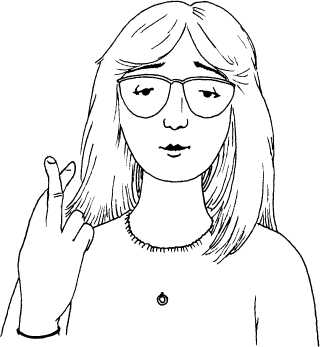

P
Don’t you ever do that
again!
I think we should vote «Yes.»
The thumb has some important uses, too. A very old gesture that is known in many places is thumbs up or thumbs down. We use thumbs up to mean "yes" or "good," and thumbs down to mean "no" or "bad." These gestures are used after a decision or a judgment has been made. For example, if someone wants to know your opinion of a new product on the market, he or she might ask, "What do you think-thumbs up or down?" If you like the product, give it thumbs up. If you don't like it, give it thumbs down. (Notice that the gesture is called thumbs up or down, but it is usually given with only one hand.)

The thumb is also used by some travelers who have no form of transportation. They hope that a driver will stop and offer them a free ride. These travelers are trying to thumb a ride.
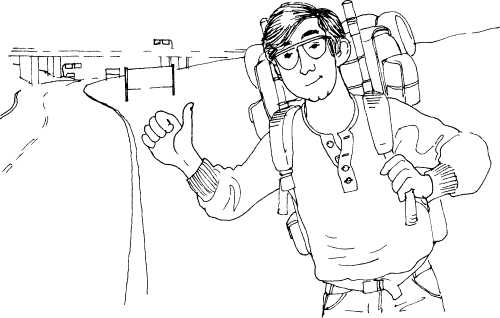
Thumbing a ride may save the traveler some money, but it is not always wise. Sometimes thumbing a ride can be dangerous. In some parts of the United States, it is also against the law.
EX EXERCISES
A. Match each situation with the appropriate action. Use each action only once.
a. I snap my fingers.
6. I cross my fingers.
c. I thumb a ride.
d. I say, "Keep your fingers crossed for me."
e. I give thumbs up.
f. I give thumbs down.
g. I shake my finger.
___b__ The teacher is returning the exam we took yesterday.
_____ 1. My car broke down, and the closest gas station is five miles away.
_____ 2. A friend asks if my favorite football team won the match yesterday.
We lost.
_____ 3. My younger brother was fighting with a neighbor's son. I shout at him.
_____ 4. I am going a job interview.
_____ 5. I see someone I know, but I can't remember the person's name.
_____ 6. A friend asks if I think I passed the English exam. It was easy.
B. Decide what gesture you were making when someone said each of these things to you.
"How far are you going?"
I was thumbing a ride.
"I'm sorry. I won't do it again."
__________________
"You can't remember the address? Why didn't you write it down?"
__________________
"You liked the film? I thought you would!"
__________________
"I'm coming as fast as I can!"
__________________
"I didn't like it either.”
__________________
"Why are you doing that? I'm sure you did well on the exam."
__________________
"I can take you to the next town."
___________________
DISCUSSION
Suppose that one of your friends is planning to thumb a ride somewhere. Make a list of suggestions for him or her to follow.
Think of several sentences like the examples below that you might say while you shake your finger at someone.
You're a bad boy.
When will you ever learn?
Many children in the United States learn the following poem. Some of them think that if you say the poem while crossing your fingers, your wish will come true. Star light, star bright, First star I see tonight; I wish I may, I wish I might Have the wish I wish tonight.
Star light, star bright,
First star I see tonight;
I wish I may, I wish I might
Have the wish I wish tonight.
Make five wishes and write them down.
In Jeddah, Saudi Arabia, there is a large sculpture of a thumb coming up out of the ground. Can we assume that this "thumbs up" has the same meaning that we learned here? Use your imagination and think of several explanations for what the artist was trying to communicate.
Are the fingers and thumb used to communicate the same things in your country that we learned here? Which of the gestures mentioned here are not used in your country
____________________________________________
UNITS 1-3 REVIEW
to cross one's fingers to shake hands
to give someone the eye to shake on it
thumbs down to shake one's finger at someone
thumbs up to snap one's finger
to have shifty eyes to thumb a ride
to look someone in the eye to wave one's hand
to make eye contact to wink at someone
to raise one's hand
__________________________________________________________________
EX EXERCISES
Circle the correct answer.
Who are more likely to have shifty eyes?
b
 ank
tellers bank robbers
ank
tellers bank robbers
bank robbers
Who are more likely to raise their hands?
a. teachers
b. students
Who are more likely to thumb rides?
a. people traveling on foot
b. people traveling by bicycle
Who are more likely to look others in the eye?
a. people who tell lies
b. people who tell the truth
Who are more likely to cross their fingers?
students before taking an exam
students after taking an exam
Who are more likely to shake their fingers?
people who are angry
people who are pleased
Who are more likely to give thumbs up?
a. winners
b. losers
7. Who are more likely to wink at others?
a. serious people
b. jokers
Who are more likely to shake on it?
a. people who agree
b. people who disagree
Who are more likely to make eye contact?
a. people who aren't attracted to each other
b. people who want to meet each other
Who are more likely to give thumbs down?
a. people who succeed
b. people who fail
B. Match the appropriate gesture with- what someone says.
c “It tastes awful!”
a. raise one's hand
b. wink at someone
c. give thumbs down
d. shake on it
e. give thumbs up
f. look someone in the eye.
g. cross one's fingers h. wave one's hand i. shake one's finger j. thumb a ride
k. shake hands
_____ "Wish me luck."
_____ "Agreed."
_____ "This is very good."
_____ "Nice to meet you.
_____ "Don't ever do that again."
_____ "My car broke down.
_____ "And that's the truth.
_____ "I'm not really serious."
_____ "Present."
_____ "Have a good trip."
C. What will you do if these things happen?
You know the answer to a question.
I’ll raise my hand.
You want to travel cheaply.
______________________
You meet someone for the first time.
______________________
You and a friend agree on a business deal.
______________________
You feel very strongly about what you are saying.
______________________
You tell your brother a true story.
_____________________
You want to show that everything is all right.
______________________
You remember something.
_____________________
You see someone you know across the room.
_____________________
You are telling a joke to someone.
The teacher calls your name while taking attendance.
_____________________
You hope something will come true.
_____________________
You want to say "good-by" to someone across the street.
_____________________
You are angry and tell someone not to do something.
_____________________
You want to signal that you don't like something.
_____________________
You see someone you'd like to meet. (3 answers)
_____________________
_____________________
_____________________
UNIT 4
T
RE READING
Some people think the head is the most important part of the body. If people tell you that you "have a good head on your shoulders," they mean you are intelligent or wise. A comment like this makes a person feel proud. When you are proud of yourself, you feel good because you did something well. When you feel proud, you probably hold your head up. That is, you put your shoulders back, raise your chin, and, probably, smile. (Note: you can say "hold up one's head" or "hold one's head up.")
Sometimes you might use this gesture for other reasons. If you want to show others that you are not afraid, or when you are pretending to be unafraid, you might hold up your head. If something bad has happened to you, but you don't want others to know how you feel, you might hold up your head. This is a way to demonstrate courage or bravery under difficult circumstances.
People use this expression to describe someone who has shown courage or someone who has made the best of things. They say, for example, "Joe felt terrible about losing the game, but he held his head up and congratulated the winner."
Feeling ashamed is the opposite of feeling proud. If you do something bad or wrong, and others find out about it, you will probably feel ashamed. To show this, you lower or hang your head.
